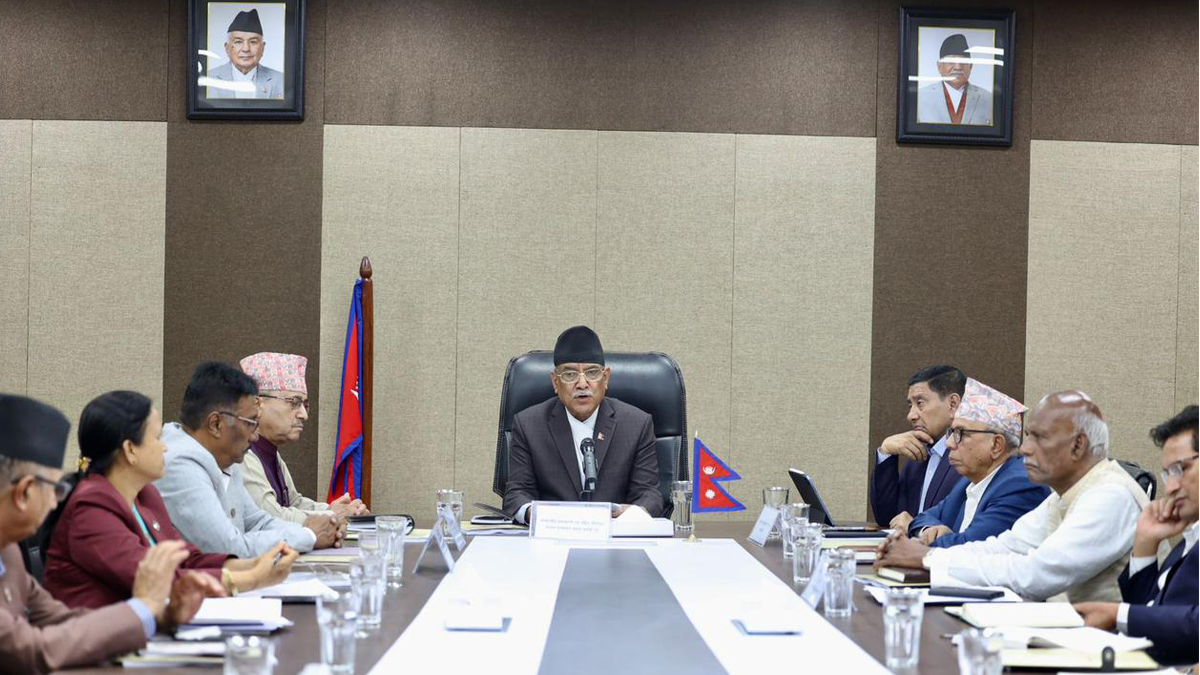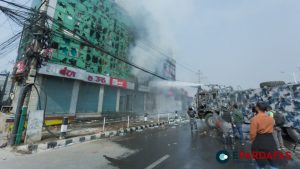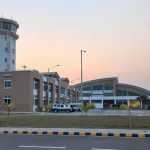
Prime Minister’s directive to employees to be prompt and proactive during disasters

Prime Minister Pushpa Kamal Dahal ‘Prachanda’ has directed the employees to work as the servants of the people rather than as ‘administrator’ at times of disaster.
Addressing the 11th meeting of the National Disaster Risk Reduction and Management National Council in Singha Durbar today, the PM said, “Why is it that we are not able to arrange for the basic logistic materials required for rescue and relief before the start of the rainy season and why are we hassling the citizens by creating a cumbersome administrative difficulties on such a sensitive matter?”
He wondered why the government employees presented themselves as if they are the officialdom’s leadership and administrators when what is required of them is promptness along with humanitarian feelings in the relief and rehabilitation works.
The PM viewed that the work of disaster mitigation and management could be made effective in the real sense of the term only by becoming responsible to the above questions.
“It is the fundamental responsibility of the State to carry out policy and managerial-related preparedness before the disaster and prompt rescue and effective relief management and rehabilitation programmes during the disaster, internalizing the reality that there is a big loss of lives and properties due to natural disasters every year in Nepal,” he said.
Prime Minister Dahal said that although there is facility of availing of prior information about disaster in the present age of high advancement of science and technology, we have not been able to adopt in an effective manner.
“We can protect the national lives and properties only by breaking from the past tradition of focusing on rescue, relief and rehabilitation only after the disaster hits rather than adopting the required awareness along with prior information of the disaster,” he said.
Noting that physical infrastructures were constructed without identifying the disaster risk areas, he said this has also affected the national onus of planned development as well as created hurdles in preventing the damage to lives and properties.
Prime Minister Dahal shared that disaster risk reduction and management becomes complex in lack of public awareness, modern technology like early warning system, poverty, trend of making decision late, lack of coordination and cooperation among different agencies related to disaster management, lack of fund and training related to disaster management, lack of skilled human resources and other resources.
He directed the bodies concerned to make pre-information system related to disaster more systematic and effective, mentioning that there are many serious questions before us regarding policy, plan, programme and implementation of disaster risk reduction and management.
The Prime Minister questioned, “Why we do not reach out the settlement and communities that are at high risk of disaster and do not hold sufficient interaction about the measures to be protected from impacts of disaster.”
The country should give priority to new food and agriculture security plan and innovation in the changed structures viewing the common global problems of climate change, added PM Dahal.
He pointed the need of formulating hydrogen leadership roadmap leading water and energy sector in Asia Pacific region accepting the potentialities of energy sector, stating that a national campaign should be launched to achieve zero carbon emission by 2050.
All should be sensitive towards the increasing impacts of climate change across the world, shared PM Dahal.
He urged all to become aware and sensitive about increasing global climate change. Around 200 million people are projected to be displaced due to the impacts of climate change until 2050, according to a World Bank report. Nepal has been raising voices in the international forums for allocating separate financial assistances for itself to deal with disasters like flooding, landslides, and snowfall caused by climate change. These voices have become meaningful, he said.
Stating that the countries with low or zero greenhouse gas emissions have become victims of developed countries with high greenhouse gas emissions, he stressed the need for making a shared perception on the matter in the international forums.
He directed the concerned authorities to help distribute relief materials and reconstruct houses, roads, bridges, water pipelines, irrigation facilities and infrastructures damaged in monsoon-induced disasters.
Prime Minister Dahal also directed the respective ministries, federal, provincial and local, to effectively execute their duties relating to the preparedness and the response to monsoon disasters, and coordinate with other concerned sector in this regard.
While offering his condolences to those who died in the monsoon-induced disasters, and the bereaved families, he directed the Ministry of Health and Population to manage free treatment for the injured ones.
He expressed his gratitude to security agencies, volunteers, local community, donor agencies and all people for their help and support in the search and rescue efforts, and relief distribution.











Comments